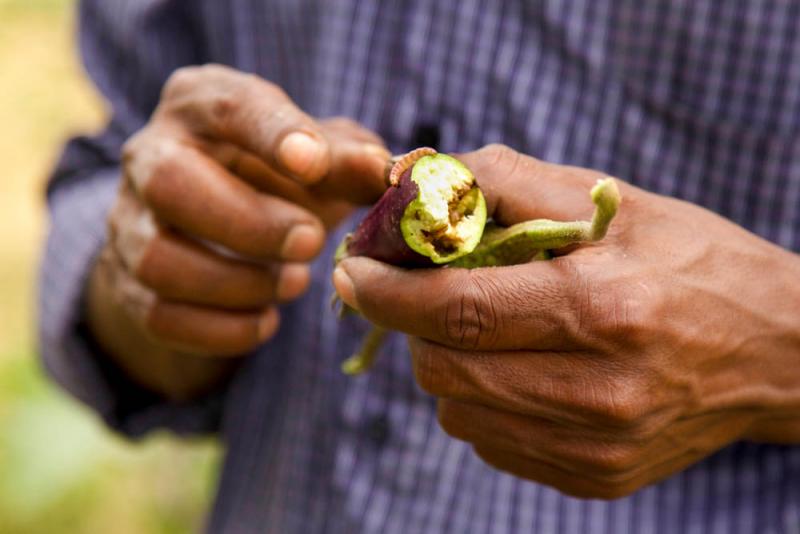
The Filipino scientific community reacted strongly to the country’s Supreme Court judgement upholding the ban on GM Bt talong (eggplant), announced on December 8 last year. The court also invalidated the existing biosafety law, potentially throwing the entire biotechnology sector into disarray.
According to Dr. Emil Javier of the Philippines National Academy of Science and Technology (NAST), the Supreme Court decision which sided with Greenpeace and other anti-GM groups pushing to block agricultural biotechnology was a “huge letdown… to say the least. Dr. Javier expressed concerns that the decision would hold back scientific progress in the country, preventing it from catching up with the developed world.
Dr. Javier wrote in the Manila Bulletin:
But the real losers are the poor farmers themselves and the consuming public. Our small farmers are deprived of modern means of raising productivity, competitiveness and incomes. They are denied potential sustainable farming technologies that can substantially reduce the need for harmful pesticides to protect their crops. And they are prevented from having access to more climate-resilient crops in the future which can tolerate drought, temporary inundation and salt-intrusion.
Other NAST experts also expressed concerns. Dr. Eufemio Rasco, author of a book on plant biotechnology, urged the Supreme Court to “reconsider its decision” on the basis that it failed to take into account the fact that stopping Bt talong would mean farmers continued to rely on existing toxic pesticides hardly an environmental boon.

University of the Philippines – Los Banos (UPLB) science students, assisted by 2015 Cornell Alliance for Science Fellow Jeremae Manalaysay, also produced a strong statement in defense of science in agriculture. The UP League of Agricultural Biotechnology Students (UP LABS) said that its members were “deeply saddened” by the Supreme Court decision, and pointed out that political will in Bangladesh had led to the successful commercialization of Bt eggplant already, with resulting 70-90% reductions in insecticide use.
The UP LABS statement also pointed out that the court decision could “decelerate agricultural development in the country… impede continuing researches on other modern biotechnology projects (e.g. Golden Rice),” and lead to loss of funding opportunities and a consequent brain drain as students left to “seek greener pastures in other countries.” The student statement was featured on the front page of the popular Philippine Star newspaper under the headline: ‘UP students slam SC on Bt talong, adding to its political impact.
The stance of the students also chimed with that of the university authorities. UPLB Chancellor Fernando Sanchez called the Supreme Court decision “a heavy blow to food security and scientific research.” In a statement, Sanchez added:
Developments such as these frustrate scientific research initiatives and dampen the enthusiasm of researchers to contribute to science-based solutions to food security and safety. With more mouths to feed and the effects of climate change upon us, the challenge to produce more food has become even more difficult with this decision that we believe lacked a good scientific basis.
The Cornell Alliance for Science accords with this viewpoint, and in a statement expressed “disappointment” with the Supreme Court verdict. It pointed out that the judges fell into the trap of ‘false balance’ by according equal merit to scientifically justified statements given in evidence by experts and more ideological assertions from anti-GMO groups.
In this decision, the Justices have sided with Greenpeace and others seeking a ban on the testing and development of Bt talong. The Court considered the submitted evidence without due consideration of scientific expertise, to the extent of granting validity to studies already shown unsound by the mainstream scientific community. Unfortunately, sources published by anti-biotechnology activists on the Internet were given more weight than peer-reviewed scientific articles published by world-renowned experts in top-ranked scholarly journals.
The statement concludes that the court decision “is a blow to the entire global scientific and agricultural communities, and a sad day for science”.
What matters now, however, is how quickly the Philippines government chooses to respond to pleas from the scientific and farming communities for a quick response to the Supreme Court’s challenge. A new biosafety law must be drafted and passed into legislation before further plant biotechnology work can be carried out in future field trials, or new imports of GMO products approved. This depends on political will but hopefully the united front shown by the expert community will lead to a quick and positive response from the nation’s politicians.
